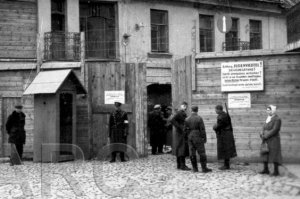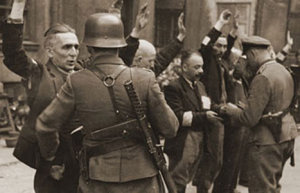If you happen to pass through Justice of the Peace Gustavo Gus
Garza’s court room, anyway.
(Mike Gogulski @ nostate.com 2008-06-08: Texas: Court-mandated assault for skipping school.)
Lawsuit: Los Fresnos JP ordered spankings
5 June 2008
BROWNSVILLE, TEXAS (AP) — A Los Fresnos family is going to court to prevent a Cameron County justice of the peace from ordering spankings in his courtroom.
A lawsuit filed today alleges Justice of the Peace Gustavo Gus
Garza told a 14-year-old girl's stepfather to strike her repeatedly on the buttocks in open court.
If he didn't, the judge said the girl would be found guilty and fined $500 for truancy.
The lawsuit by Mary Vasquez and her husband, Daniel Zurita, described the paddle provided by Garza as large and heavy and fashioned from a thick piece of lumber.
In a story for The Brownsville Herald, Garza declined to comment on whether he has people spanked in his courtroom. He also said he had not seen the lawsuit.
Zurita says he didn't feel as if he had a choice but to follow the order.
In an affidavit, Zurita says that when he was through, the judge told him he had not struck the girl hard enough.
— KGBT 4 (2008-06-05): Lawsuit: Los Fresnos JP ordered spankings
Because he coerced the stepfather into beating and humiliating his 14-year-old daughter in open court, in front of strangers, by threatening to inflict a several hundred dollar fine and a criminal record on the young woman if he didn’t do it, Justice of the Peace Gustavo Gus
Garza believes that he didn’t order
the beating; he just offered it as a punishment option.
Much like a mugger offers you an option
between your money and your life, I guess:
Justice of the Peace Judge, Gustavo Garza was in court this morning after getting sued for
his spanking punishment option. The plaintiffs are Mary Vazquez and Daniel Zurita. They
want a temporary restraining order against Judge Garza's spanking punishment. Instead,
state district judge Abel Limas has reset the hearing for next Wednesday.
The parents of a 14-year-old teenager were in court, hoping to put a stop to Judge Garza's
idea of punishment. Their complaint says that Garza told the teen and her step-father that
the teen would be found guilty of a criminal offense and fined $500 for not attending school
unless Zurita spanked his step-daughter in the JP courtroom on April 9th. The couple’s
attorney Mark Sossi, argued that Judge Garza did not have the authority to order someone
to spank their child. But after the hearing Judge Garza told us again that he did not order
anyone. Parents had a choice to either spank or pay up.
I've never ordered anybody to use discipline on their children in court.
— Michelle Macias, KVEO 23 Rio Grande Valley (2008-06-06): Judge Gustavo Garza’s First Day in Court
Please note that when Garza says using discipline,
he doesn’t mean what the words would naturally suggest, that is, for the parent to exercise restraint in spite of strong feelings of anger or frustration. By using discipline,
Garza means parents lashing out rather than restraining themselves, beating their child or teenager with a wooden bat, and laying it on well, while they do so.
Of course, there’s more. Because there’s always more. Court-ordered teen-beating isn’t just a good way to deal with the victimless crime of choosing not to go to a government school. What with the criminalization of everything, especially everything that young people might do, it’s a good way to deal with all kinds of things. Like disabled teens who swear at school bus drivers:
A petition against Gustavo Gus
Garza grew by two on the eve of a temporary restraining order hearing against the Cameron County Pct. 6 Justice of the Peace.
The parents of two minors came forth Tuesday, asking 404th state District Judge Abel C. Limas to prevent Garza from ordering, encouraging or allowing spankings in his courtroom as punishment.
I wouldn’t hit a child with a paddle, particularly one with physical problems,
plaintiffs’ attorney Mark Sossi told The Brownsville Herald late Tuesday. Sossi was referring to one of the two children, who suffers from a muscular-development birth defect and allegedly was spanked in Garza’s court.
The child with the disability is a 14-year-old boy who used profanity toward a school bus driver. The second is a 14-year-old girl who skipped class, Sossi said, shortly after filing his amended petition in district court. The respective parents are Leroy Garcia and Rosa Valdez.
. . .
The parents also seek Garza’s removal from office [in addition to a restraining order].
After parents feel compelled to spank their children, they claim, Garza orders the children to bend over a chair placed directly in front of the bench. They are ordered to put their elbows on the arms of a chair with the buttocks facing Garza.
(Garza) has long engaged in this kind of corporal punishment under the authority of his office. Ten years ago when the defendant was a district attorney in Willacy County, he used the color and authority of his office to threaten criminal prosecution unless the parents struck their children with a wooden paddle he owned,
Sossi states in the amended petition.
The initial petition alleges Garza directed Zurita to repeatedly strike his stepdaughter on the buttocks with a large, heavy wooden paddle fashioned from a thick piece of lumber in open court and in the presence of other adults and juveniles.
Zurita stated in an affidavit that, I did not feel that I had a choice but carry out the orders of the judge. When I was finished, Judge Garza told me that I had not struck (my stepdaughter) hard enough…
Zurita and Vasquez also claim that they were in Garza’s courtroom when he ordered the paddling of other minors.
Garza said Friday that he has not kept count on the number of children paddled in his court.
— Emma Perez-Trevi?@c3;b1;o, The Brownsville Herald (2008-06-10): More families file against spanking judge
Justice of the Peace Gustavo Gus
Garza believes that Texas state law is on his side:
Judge Garza says his disciplinary option does not break any Texas law.
I believe and as you will find the law will support me. The penal code addresses it for parents and educators to use it for discipline, the family code obligates it.
— Michelle Macias, KVEO 23 Rio Grande Valley (2008-06-06): Judge Gustavo Garza’s First Day in Court
I don’t know whether or not Garza really meant to claim that the Texas state family code obliges parents to beat up self-willed children and teenagers in the name of discipline.
That seems odd. But I don’t know much about Texas state law, and he is Da Judge, so, for all I know, he may very well be right about the contents of the Texas penal code and the contents of the family code. The legal condition of children and teenagers throughout the United States is generally pretty appalling. But if he is right, then that’s a good reason to say to hell with the penal code and the family code.
To prove, that these Sort of policed Societies are a Violation offered to Nature, and a Constraint upon the human Mind, it needs only to look upon the sanguinary Measures, and Instruments of Violence which are every where used to support them. Let us take a Review of the Dungeons, Whips, Chains, Racks, Gibbets, with which every Society is abundantly stored, by which hundreds of Victims are annually offered up to support a dozen or two in Pride and Madness, and Millions in an abject Servitude, and Dependence. There was a Time, when I looked with a reverential Awe on these Mysteries of Policy; but Age, Experience, and Philosophy have rent the Veil; and I view this Sanctum Sanctorum, at least, without any enthusiastick Admiration. I acknowledge indeed, the Necessity of such a Proceeding in such Institutions; but I must have a very mean Opinion of Institutions where such Proceedings are necessary. [...] In vain you tell me that Artificial Government is good, but that I fall out only with the Abuse. The Thing! the Thing itself is the Abuse!
— Edmund Burke (1757): A Vindication of Natural Society
Meanwhile, the comments thread, here’s how to maintain high moral standards and exonerate sadist judges in ten easy steps:
Conflate force with reason:
I myself have spanked my kids in the butt area. Only once in a long while to teach my kids right from wrong. . . . Teach your daughter the consequences of not been in school. Don’t wimp out and try to be her friend.
— Sy A, Edinburg, comments on KGBT 4 (2008-06-05): Lawsuit: Los Fresnos JP ordered spankings
How are they going to learn if there is no discipline?
— lachancla, reader comments (2008-06-11) on Emma Perez-Trevi?@c3;b1;o, The Brownsville Herald (2008-06-10): More families file against spanking judge
Blame the victim:
WHY IS THE BOTTOM LINE NOT SEEN HERE? These kids are not in court because they are honor students! They are discipline problems!!
— chula71, reader comments (2008-06-11) on Emma Perez-Trevi?@c3;b1;o, The Brownsville Herald (2008-06-10): More families file against spanking judge
Children with disabilities? That kid certainly was very able to run his mouth off to the bus driver. All this is drama for your mama.
— donkique, reader comments (2008-06-11) on Emma Perez-Trevi?@c3;b1;o, The Brownsville Herald (2008-06-10): More families file against spanking judge
Blame the victim’s parents:
The article never mentioned the mothers role or lack there of??? I wonder if the child has been late for school since the step-father opted to save her future by not paying the fine and allow a criminal history?
— Patrick R. Murray, comments (2008-06-05) on Nikki W., Digital Journal (2008-06-05): Judge Sentences Children To Spankings By Parents And One Family Is Fed Up
Man, these parents are something else. . . . Obviously the judge is doing the job the parents have failed to do. I wonder if these parents read these blogs and feel just a little dumb for trying to milk the county for their child’s inability to stay in school or behave?
— chula71, reader comments (2008-06-11) on Emma Perez-Trevi?@c3;b1;o, The Brownsville Herald (2008-06-10): More families file against spanking judge
The kid's step father couldn't control the kid (Is he a wimp?). Far too many judges refuse to enforce the law. Judge garza should be recognized for enforcing the law. The parent had three choices: Make thge kid go to school, pay a fine, or paddle the kid–and he is now crying about his choice. Again, I ask if he is a wimp?
— retired principal
Terry Olbeg, McAllen, comments on KGBT 4 (2008-06-05): Lawsuit: Los Fresnos JP ordered spankings
Blame the lawyers:
What these people don’t understand is that the only one that will come out winning is the lawyer(s). The more petitioners, the more the lawyer gets and the less they get.
— peepaw, reader comments (2008-06-11) on Emma Perez-Trevi?@c3;b1;o, The Brownsville Herald (2008-06-10): More families file against spanking judge
These people are being led by the nose by sharks, aka lawyers.
— donkique, reader comments (2008-06-11) on Emma Perez-Trevi?@c3;b1;o, The Brownsville Herald (2008-06-10): More families file against spanking judge
Blame the victim’s socioeconomic class:
I bet you she will be pregnant and on public assistance before she is 18 years old. Thats all we need another dumb teenaged parent with an attitude. Sorry if it seems harsh but thats what it is. Just a thought!
— L Deleon, Harlingen, comments on KGBT 4 (2008-06-05): Lawsuit: Los Fresnos JP ordered spankings
I guess everyone forgets about the drop out kids from school who because of lack of education leads to no job and deperation for money which might lead to theft,burglary (your neighboorhood)robbery. More drain on the goverment assistance.
— D Morales, Harlingen, Texas, comments on KGBT 4 (2008-06-05): Lawsuit: Los Fresnos JP ordered spankings
Blame other youths, unrelated to this case, because you presume that the youths in this case are kind of like those other youths:
I feel compelled to spank my child as well too but I don’t. I would if she acted like some of these punks though.
— lachancla, reader comments (2008-06-11) on Emma Perez-Trevi?@c3;b1;o, The Brownsville Herald (2008-06-10): More families file against spanking judge
Some kids do need a good spanking. Especially if this punishment averts any other form of criminal activity.
— harmony, comments (2008-06-05): on Nikki W., Digital Journal (2008-06-05): Judge Sentences Children To Spankings By Parents And One Family Is Fed Up
I wonder how many people would make the same comment if they worked in a public school you have no idea what type of behavior kids have in school. Texas Law allows the parent to discipline their child but when the parent wants to do so their child threatens to call police and file assault charges against them.
— D Morales, Harlingen, Texas, comments on KGBT 4 (2008-06-05): Lawsuit: Los Fresnos JP ordered spankings
Impugn the parents’ motives without evidence:
Man, these parents are something else. Jumping on the band (more like BANK) wagon to gain notoriety. WHY IS THE BOTTOM LINE NOT SEEN HERE?
— chula71, reader comments (2008-06-11) on Emma Perez-Trevi?@c3;b1;o, The Brownsville Herald (2008-06-10): More families file against spanking judge
If the parents thought this was embarrassing then they should have paid the fine. A choice was given so why are they crying about it now. The lawyer and the parents are probably doing this for the money.
— I. Flores, Mid Valley, comments on KGBT 4 (2008-06-05): Lawsuit: Los Fresnos JP ordered spankings
[The story says only that the parents are seeking a restraining order against Garza and, if possible, his removal from the bench. As far as I can tell there is no mention of their seeking monetary damages. Not that there would be anything wrong with it if they are. –R.G.]
Compete to see who can go most over-the-top in their praise of beating and terrorizing children:
Go Judge Garza! It’s about time someone taught kids now a days about discipline. This lawsuit is a joke. If we as parents don’t want to be at this point where we are at court having to spank our kids in front of a group of people, we need to start doing it at home.
— N R, Los Fresnos, comments on KGBT 4 (2008-06-05): Lawsuit: Los Fresnos JP ordered spankings
I think their is always two sides to the story. Many of the kids today need corporal punishment. I am thankful that my principal and school community still allow my principal to spank kids. As a school administrator it is very simple to know what school still uses paddling and which one doesn’t. Most of the ones with the most discipline problems do not spank. I would like to hear more about why this J.P. ordered the spanking. A firm supporter of spanking. Get’m Judge.
— Anonymous school counselor, Edinburg, comments on KGBT 4 (2008-06-05): Lawsuit: Los Fresnos JP ordered spankings
As we were growing up we got spanked, not beat, and we grew up just fine. I believe in spanking on the buttom. It is even in the bible. . . . Save you children now while you still can, don’t be too soft on them. I had my children spanked in school if and when they did wrong. There is nothing wrong with a spanking here and then when done right. I am all for you Judge Garza, God Bless You.
— I. Flores, Mid Valley, comments on KGBT 4 (2008-06-05): Lawsuit: Los Fresnos JP ordered spankings
When I went to school, we were threatened with the slap.
the school had two different types. They had a red leather slap and a black one. I forgot which one was thicker. The strap was used as a form of discipline and it worked. Kids were too afraid of getting the strap therefore they were obedient. Most kids were never given the strap because they knew better. Today kids are threatening and abusing their teachers. I’m beginning to think that the schools should implement the strap again.
— harmony, comments (2008-06-05): on Nikki W., Digital Journal (2008-06-05): Judge Sentences Children To Spankings By Parents And One Family Is Fed Up
Spank Her Good
The judge should have had a police officer spank that brat. Getting a strong, muscle-head cop to do the spanking would have been ideal. Then I would have paddled the hell out of the parents too. They know when their child is not attending school.
— L Deleon, Harlingen, comments on KGBT 4 (2008-06-05): Lawsuit: Los Fresnos JP ordered spankings
I feel compelled to spank my child as well too but I don’t. I would if she acted like some of these punks though. How are they going to learn if there is no discipline? time out?
I would take a time out from the spanking. There is your time out.
— lachancla, reader comments (2008-06-11) on Emma Perez-Trevi?@c3;b1;o, The Brownsville Herald (2008-06-10): More families file against spanking judge
Quibble over semantics:
What do you mean by ordering a forced beating?
If it falls under the category of abuse causing bodily harm, then I don’t think it’s legal.
— harmony, comments (2008-06-05): on Nikki W., Digital Journal (2008-06-05): Judge Sentences Children To Spankings By Parents And One Family Is Fed Up
As we were growing up we got spanked, not beat, and we grew up just fine.
— I. Flores, Mid Valley, comments on KGBT 4 (2008-06-05): Lawsuit: Los Fresnos JP ordered spankings
Spanking is without the use of an aide. A beating uses such, although corporal punishment is different than parental discipline.
Parents do not spank with a belt, flyswatter, switch – they bust ass or administer a whoopin!
They spank with a hand. And if the mark remains, it is child abuse.
— Nikki W., comments (2008-06-05): on Nikki W., Digital Journal (2008-06-05): Judge Sentences Children To Spankings By Parents And One Family Is Fed Up
@ Connie M (Catana)
I don’t consider being hit with a board a spanking. It’s a beating, plan and simple.
If there are no marks, bruises or broken bones, it’s a spanking, plan and simple.
If there are no marks, bruises or broken bones, it’s a spanking, plan and simple.
— harmony, comments (2008-06-05): on Nikki W., Digital Journal (2008-06-05): Judge Sentences Children To Spankings By Parents And One Family Is Fed Up
[Alberto Gonzales and Donald Rumsfeld would be proud. –R.G.]
Ramble aimlessly about the good old days and the decline of patriarchal traditions:
Hoping Good Old Times Come Back
As we were growing up we got spanked, not beat, and we grew up just fine. I believe in spanking on the buttom. It is even in the bible. Back in the days teenagers were allowed to work too if this was brought back up we would not have as much trouble today. We would go to school, work after school and we would respect our elders. There was not as much trouble as we have now. There was no time for trouble because we were occupied. I did all this and I grew up to be a responsible, repectable adult.
— I. Flores, Mid Valley, comments on KGBT 4 (2008-06-05): Lawsuit: Los Fresnos JP ordered spankings
What is with all these women not taking their husbands name? Do they jump around so much that it is too much to keep up with their last names, so they keep their’s?
— peepaw, reader comments (2008-06-11) on Emma Perez-Trevi?@c3;b1;o, The Brownsville Herald (2008-06-10): More families file against spanking judge
When people engage in violence against children for victimless crimes
like ditching school or mouthing off to adults; when they claim that the violence is to teach
its victim a lesson; when you spend the first two decades of your life being indoctrinated and ridiculed and beaten and extorted into believing in, or at least acquiescing to, this kind of violent, legally-backed authoritarianism, and when this is dignified as raising a child
the right way, when howling mobs of sado-fascist blowhard bullies can be expected to ridicule and blame any parent who doesn’t toe that line and enthusiastically beat their own children, when that same bellowing blowhard bully brigade looks looks for absolutely any and every excuse they could possibly find to justify beating a child or a teenager and compete to see who can get the most down and dirty in their efforts to smear the victim and cheer on the violence; what sort of lessons
do you think that violence and that rhetoric teaches? What sort of a life, and what sort of a society, do you think that this kind of physical and verbal environment prepares these children for?
Further reading:




